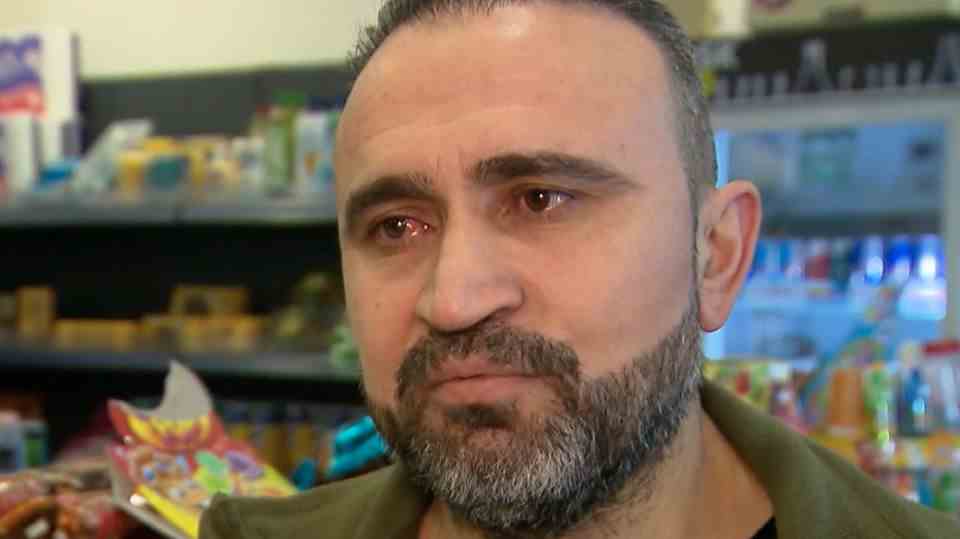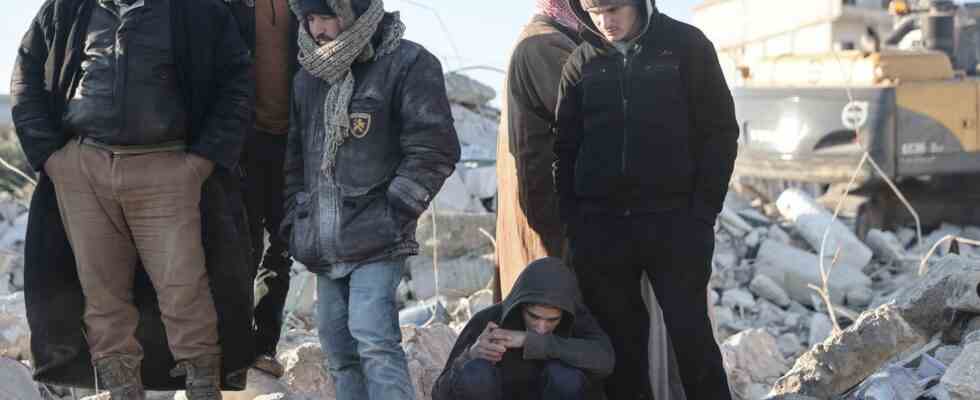difficult help
Syria would have to open border crossings to help earthquake victims – but Russia is blocking it
Residents in the city of Harim in northern Syria inspect a collapsed building
© Anas Alkharboutli / DPA
After the devastating earthquake, international aid is ramping up. It is not yet clear whether it will also arrive in Syria. The civil war and closed border crossings have so far made support difficult.
Aid organizations from many countries made their way to Turkey just a few hours after the earthquake on Monday. Germany, France and the USA, among others, promised to also help the Syrian victims, but without immediately sending help. “Syria remains a gray area from a legal and diplomatic point of view,” says Marc Schakal, head of the Syria program for the aid organization Doctors Without Borders. He insists on sending help “as soon as possible”.
Jackal fears that local and international aid organizations will be overwhelmed by the situation in Syria. There has been a civil war there for twelve years, rebels, jihadists, Kurdish forces and government troops are facing each other, ruler Bashar al-Assad is supported by Russia and Iran and ostracized by the West.
Concerns about people in Idlib province
Help for Syria is particularly urgent because “the situation of the population was already dramatic before the earthquake,” says Raphaël Pitti of the French non-governmental organization Mehad. Above all, he worries about the people in the province of Idlib. 4.8 million people live in the rebel- and Islamist-controlled region in north-west Syria, who are difficult to reach. Almost all humanitarian aid comes through Bab al Hawa – the only crossing of the Turkish-Syrian border guaranteed by a UN resolution.
Damascus and Moscow see Syrian sovereignty violated by the transition, and over time Bab al-Hawa has been steadily reduced in size. This could quickly lead to traffic jams at the small border crossing. Experts consider it unlikely that other former border crossings will be reopened. Above all, Russia must end its blockade of border crossings in order to “let more humanitarian aid in to Idlib,” Green Party leader Omid Nouripour demanded.
Major Earthquake
More than 5,000 dead, snow and cold hamper the rescue: Turkey and Syria are fighting for those buried
Delivering aid from government-controlled Syrian territory would be diplomatically problematic. The prerequisite for this would be that Damascus would pass them on to the population in the rebel area and that the warring parties would agree on the distribution.
The Syrian government has urgently asked the international community for support because of the earthquake damage. Syrian Ambassador to the UN Bassam Sabbagh on Monday assured that the aid would benefit “all Syrians across the country” but made it a condition that it had to be delivered from the interior controlled by Damascus.
Western countries do not want to deliver directly to Syria
It remains questionable whether Western countries will get involved. “It’s about helping people in need, and of course this help has to reach people in every possible way,” said Foreign Office spokeswoman Andrea Sasse on Monday.
The federal government therefore wants to work with international organizations on earthquake relief, with which it has already provided humanitarian aid in the region. The aid organization Malteser International is active in north-west Syria. The federal government will increase the aid for the partner organizations working in Syria by another million euros, said Sasse.

Pitti believes that earthquake areas under the authority of Damascus are likely to receive international aid. He fears that Idlib, where 2.8 million internally displaced persons live, could get nothing, especially since neighboring Turkey is busy with its own victims.
Aid from the United Arab Emirates could reach the Syrian earthquake victims the fastest. The country already pledged $13.6 million (€12.7 million) in support on Monday.

